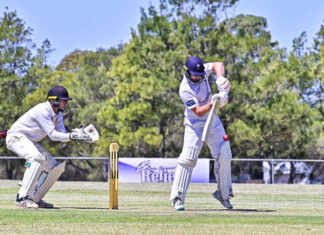Andrew Mathieson
THE best mate spent a year trying to talk him out of the walk.
Another, a former Brownlow Medallist, said plans to backpack heavy supplies thousands of kilometres would ensure the Belmont charity walker would never stand straight again.
But John Olsen, who idolised Australia’s earliest explorers, never doubted he would make it home to Geelong on foot from North Queensland’s Cape York to the bottom of Tasmania.
Then from Western Australia to Byron Bay and eventually back to Geelong on a separate Australian-first odyssey.
Flinders, Bass, Hume and Hovell, Burke and Wills and, now, Olsen.
“Half way through my first trip, when I got to Toowoomba I knew I was definitely going to make it home – unless I got run over by a truck,” John grins.
“I also knew I wouldn’t be content in doing just a north-to-south walk.
“I essentially started thinking of my second walk half way through my first.”
The 57-year-old has overcome more than just distance, isolation and the mental demons that come with shuffling 12,663km – or about $8.52 for every kilometre of his fundraising treks – in almost 400 days over seven years.
John’s unwell wife left him to raise their four children as he battled the booze 25 years ago.
He stopped drinking immediately but later watched two close friends die in their prime and was nearly wiped out by a speeding car at a red light.
The shock gave him a second lease on life and, approaching 50, he took up running about six kilometres a day, seven days a week for three years.
Fighting fit, the next challenge was to walk the length of the country.
Fellow Geelong Lions Club members Brian Edward and Bob Hose, who encouraged the landscaper to raise money for cerebral palsy and later leukodystrophy, drove John to Australia’s northern most point in 2002.
“Brian had spent 12 months trying to convince me not to do it and he’s supposed to be my best mate,” John tells.
“He didn’t think it was possible.”
Gordon Collis, a former Carlton footballer who won the 1964 Brownlow, designed a trolley based on the designs of a golf cart and a traditional Chinese handcart for carrying haystacks.
After giving up an illustrious football career at 26 through a serious back injury, Gordon murmured a warning to his mate: “You’d probably make it, John, but you’d never walk again.”
They knocked up the trolley in three days and the paint was still wet when John left.
After putting on between 10kg and 20kg of body fat to reach 85kg for the walks, John survived on dried soups and, at last count, 162 packets of chicken curry pasta.
“It’s good until you have to have it every day,” he laughs.
Travelling for a second time through Western and South Australia, John faced more than 3500km of remote desert, including a 1430km stretch with no towns, no stations and no people until Coober Pedy.
“I spent two weeks pulling that damn trolley four inches at a time, going backwards and digging my feet into the sand,” he vividly remembers.
“Up the sand dune, down the sand dune – it wouldn’t even roll down.”
John set targets to travel from bush to bush – sometimes just 20 feet apart – while a sandstorm restricted his vision to just two feet.
The worst moment was pulling the cart for six hours only to see the dune he left in the morning still in the landscape.
“That’s soul-destroying because you feel you’ve got nowhere,” John says.
“That’s when I started to panic and I remembered I screamed like hell that day.”
John cheated death many times.
In a near-miss, lightning struck a fence just a metre away as he sheltered under a small tree in the Blue Mountains.
“There were sparks going down the fence line and there I was strapped onto a steel trailer of sorts,” he sighs.
John also saw lightning destroy a Queensland winery gazebo, which he had planned to sleep under.
But it was an unexpected case of pneumonia after returning from Tasmania that delayed his next charity walk for five years.
He rolled into Geelong Hospital’s emergency department at 5am only to shake and sweat in a hospital bed for the next week.
“That took me nearly two or three years to get over,” John remarks.
“I’d never even had a cold for about 30 years.”
Stepping out to help
Digital Edition
Subscribe
Get an all ACCESS PASS to the News and your Digital Edition with an online subscription
Grace and Meehan top the charts
Scores, runs and wickets from Saturday’s play in Geelong Cricket Association and Bellarine Peninsula Cricket Association matches.
Standout performances included Corio's Mitch Grace (6/6), Teesdale's...








